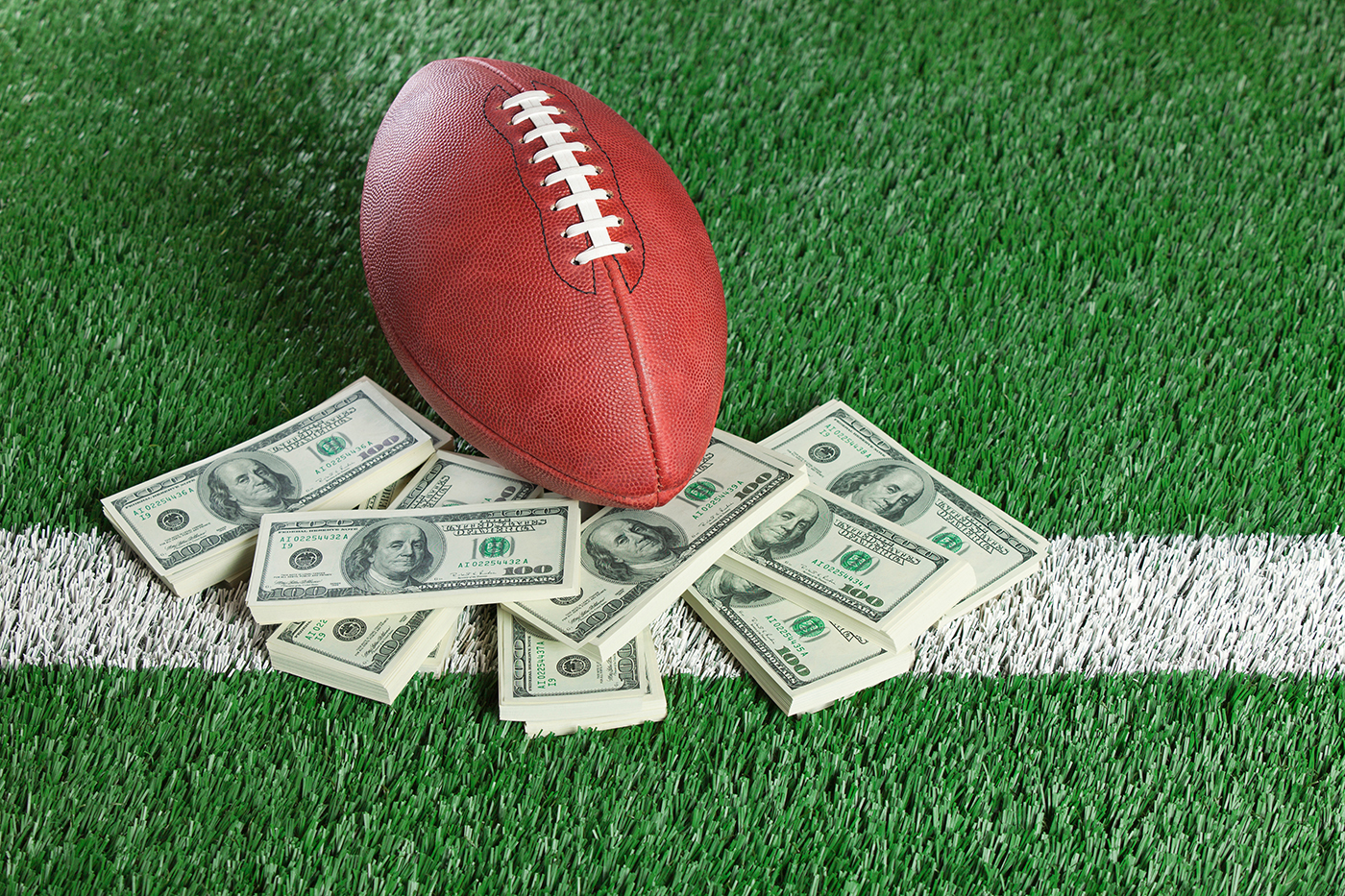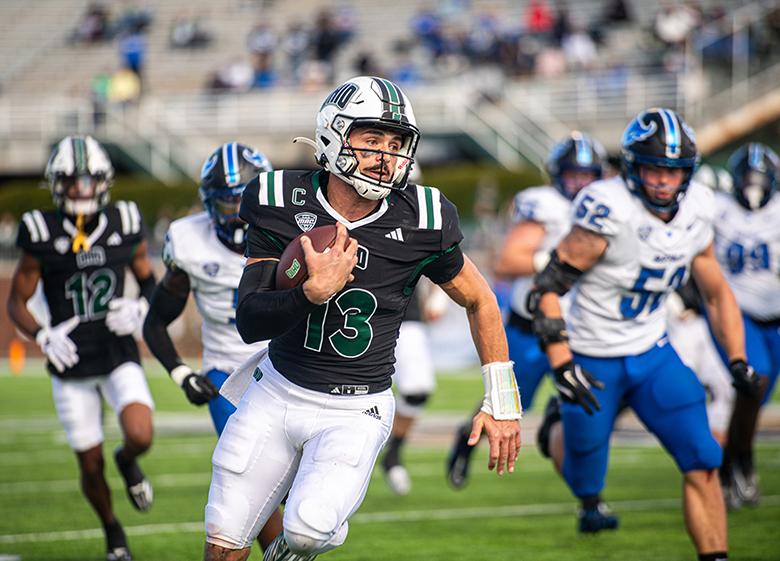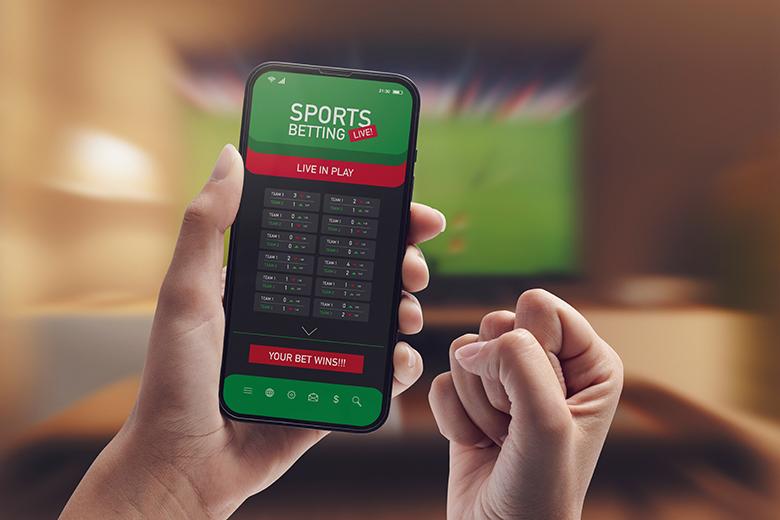As recent as 20 years ago, sports betting was something generally seen as taboo. Until very recently, professional sports leagues distanced themselves from gambling of any kind. This year, betting on the National Football League (NFL) is at an all-time high with an estimated $35 billion to potentially be wagered this season, a 30 percent increase from last year, according to the American Gaming Association.
The NFL’s embrace of sports betting was sudden but not unexpected. Jim Strode , an expert in sports betting, says a 2018 Supreme Court decision is one factor that opened the floodgates for the NFL to go all in on gambling. Strode is an associate professor of Sport Management in Ohio University’s College of Business and has recently examined the influence of bettor behavior and bias in sports gambling markets .
“The NFL, like all professional sports leagues, is a business looking for ways to generate revenue,” said Strode. “Many professional sports leagues kept sports betting an arm's length away due to the history of corruption [and organized crime] involved in sports gambling. When the Supreme Court did strike down [the Professional and Amateur Sports Protection Act] , states were able to not only legalize [sports betting], but also regulate it.”
Strode went on to explain that the NFL could now point to the fact that sports betting is a legal activity when further integrating it into their brand and culture. Because it is now legally accessible and something their consumers want, it's ultimately a way for the league to generate more interest which translates to more revenue.
How has the increase in sports betting impacted the NFL?
Strode says in terms of advertising and business, professional sports leagues have additional sponsorship opportunities with sports betting organizations. For the NFL, it’s a matter if having more organizations available to sponsor teams, sponsor stadiums and advertise.
“It's hard to escape the fact that when you watch any of these games, you're going to get a DraftKings commercial that's going to incentivize you to download their app and get your foot in the door,” emphasized Strode. “It’s another business partner that's going to help fund the operations.”
Indirectly, the increase in sports wagers may have led to the increase in the number of games in the NFL season and a push for further increases . More games equal more money, and also more opportunities for bets.
“We've seen the NFL has found ways to be able to buck the traditional Sunday 1:00, 4:00 model, [then came] Monday Night Football, later, Sunday Night Football, now, Thursday Night Football, now, doubleheaders on Monday Night Football,” Strode said. “The league has expanded beyond its traditional time slots which also gives people more opportunities not only to watch but certainly to bet.”
Strode says the NFL is also doing a good job leveraging sports betting to market games that may not necessarily be marquee. Gaming, sports betting and gambling provide an increase in interest for games that otherwise would not get as much attention. This also puts more eyes on games that don’t include fans’ hometown teams.
How has the increase in sports betting impacted players?
Anytime people begin to put money on something, the intensity increases. Sports betting is no exception, and Strode says it has certainly added an additional level of pressure associated with performance that can affect players. He also thinks modern communication tools oftentimes allow fans to negatively interact with players based on their performance, especially when those performances hinge on a big wager.
“I think that it has increased the level of acrimony from players to fans,” explained Strode. “We're looking at a world of social media where we have unfettered access to athletes compared to what we've had in the past. There's a lot of different ways that, we can express our displeasure at athletes.”
Strode believes the most vulnerable athletes in this regard are college athletes. While athletes in college could potentially make money in the name, image and likeness space, it is not their day job. Strode thinks this should be definitely be addressed, but noted that many states do already regulate this by not allowing prop bets at the college level.
Is sports betting damaging to fans?
Strode says sports gambling can be an addictive behavior that can certainly be damaging to finances, as well as mental health, but it is regulated and the vast majority of bettors start betting responsibly. Additionally, many states require sports betting organizations support addiction helplines and addiction services.
“You probably can't escape public service announcements that indicate ‘if you feel like you have a gambling problem, call this particular number,’” said Strode. “Those are oftentimes supported by the same organizations that are trying to get you to gamble on those games.”
Have sports betting apps increased gambling?
Sports betting apps have certainly increased the accessibility of gambling on games, according to Strode. Bettors can sit on their couch, download the app and pump some dollars into an app all without having to leave the comfort of their home.
“The technology is pretty savvy,” emphasized Strode. “When developing these apps, whether it's push notifications or other strategies these platforms are using, they’re certainly incentivized as a business to get you to bet consistently and bet more so, it's pretty hard to escape.”
While sports betting apps contribute to the ease of betting, states can regulate betting using geofencing technology. For example, a bettor in the state of Ohio can’t cross over to another state to make a wager, their app will likely not work. Bettors must be physically in their home state to place bets.
Is fantasy football sports betting?
Although state and federal law does not define fantasy sports as gambling, Strode says if there’s money on it, it’s sports gambling.
“The biggest difference between fantasy and a traditional line or a prop bet is skill versus chance,” said Strode. “[In fantasy] you get to select your own players and there is a certain level of skill that's involved in understanding who to draft, who to play to, who to start—the people that are really doing it well are the ones that have the algorithm loaded up on their spreadsheets, and that's certainly not a game of chance, like a roulette wheel or pulling, pulling a handle on a slot machine.”
As of April 2020, 21 states have enacted laws to confirm that fantasy sports are legal games of skill, according to the Fantasy Sports and Gaming Association.
What is the future of sports betting and the NFL?
If sports betting does anything for the NFL and other professional sports leagues, it puts more eyes on games. Strode thinks there will be additional opportunities for sports betting to grow in the coming years as it becomes more mainstream. He also believes sports betting will fall into the same domain as other behaviors society may have not necessarily approved of in the past especially since the Supreme Court gave it more credibility. Additionally, Strode thinks sports betting organizations will continue to invent ways to get people to continue watching games—a prospect the NFL certainly enjoys.
“These sports gambling organizations are going to find ways to be able to adjust the line, take new bets at halftime, or there might be some other prop bets associated with a player throwing ‘x’ number of touchdowns, or a particular thing happening during a game,” said Strode. “They're going to continually try to make it interesting and get the consumer to put more and more money on a game beyond the traditional betting against the spread.”





